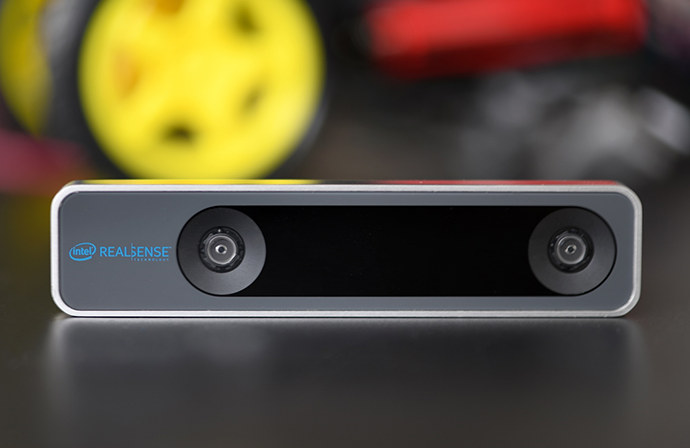Intel has just launched another smart camera with RealSense Tracking Camera T265 powered by the company’s Myriad 2 VPU (Vision Processing Unit) also found in the first Neural Compute Stick, and designed for autonomous robots, drones, and augmented/virtual reality applications.
The T265 camera is said to use proprietary visual inertial odometry simultaneous localization and mapping (V-SLAM) technology “delivering high-performance guidance and navigation”.
Intel RealSense tracking camera T265 hardware specifications:
- VPU – Intel Movidius Myriad 2 vision processing unit with 12 VLIW 128-bit vector SHAVE processors optimized to run VSLAM at low power
- Cameras – 2x Omnivision OV9282 high-speed image sensors with Fisheye lenses for a combined 163±5° FOV; infrared cut filter
- Sensor – Bosch BMI055 6-axis IMU (Inertial Measurement Unit) to measure rotation and acceleration of the device
- USB – 1x USB 3.1 Gen 1 Micro B port to transfer pose data, or pose + image data.
- Dimensions – 108 x 24.5 x 12.5 mm; 2x M3 0.5mm pitch mounting sockets (50 mm apart)
The V-SLAM systems construct and continually update maps of unknown environments and the location of a device directly on the device itself. T265 can be used in combination with RealSense D400 series cameras to add 3D depth sensing for applications like occupancy mapping, improved 3D scanning, and advanced navigation and collision avoidance in GPS-restricted environments.
The T265 camera is supported by Intel RealSense SDK 2.0 for Windows, Mac OS, and Linux, and is up for pre-order for $199.00 with shipping planned for early March. More details can be found on the product page.

Jean-Luc started CNX Software in 2010 as a part-time endeavor, before quitting his job as a software engineering manager, and starting to write daily news, and reviews full time later in 2011.
Support CNX Software! Donate via cryptocurrencies, become a Patron on Patreon, or purchase goods on Amazon or Aliexpress






I wonder if this work well for hobby UAV applications. GPS only really works when you’re flying high enough.
If it’s fast enough maybe it could help with path correction to avoid drone meets tree situations.
Anyhow, is this made on a 7nm process? That’s all that matters.
Really, “50 cm apart”? Or mm?